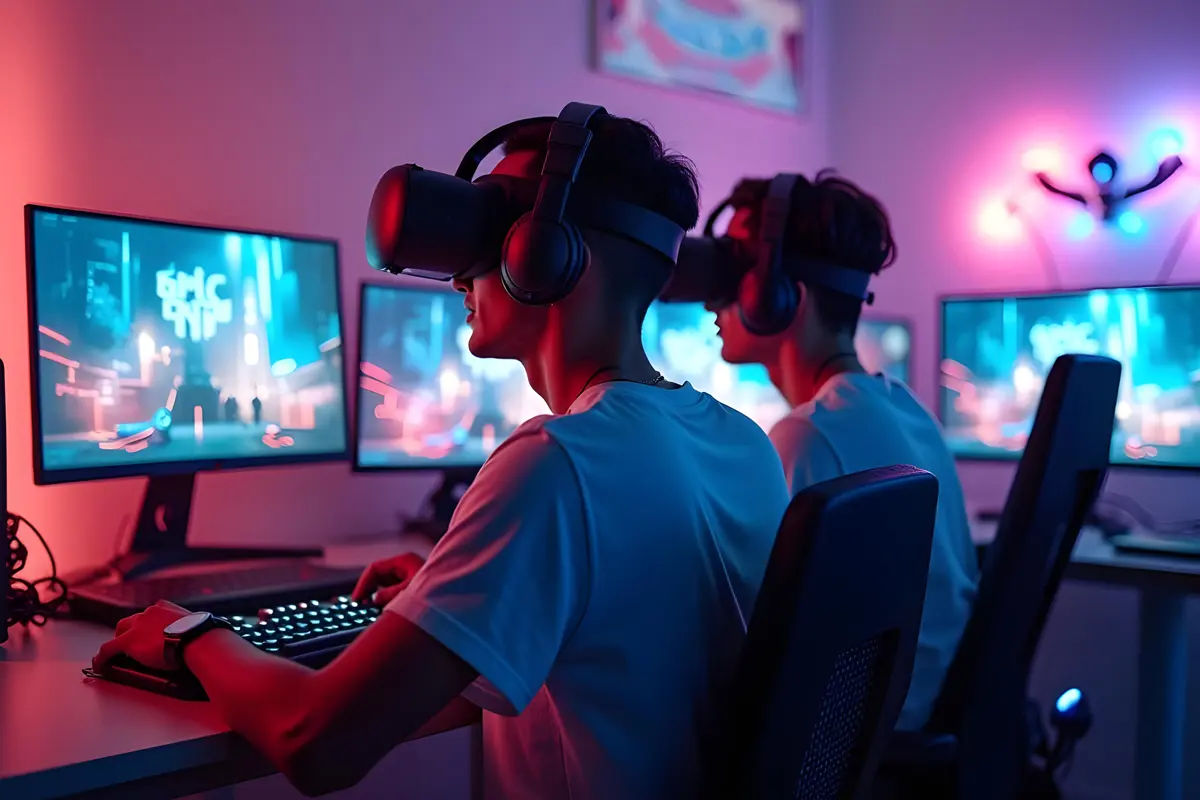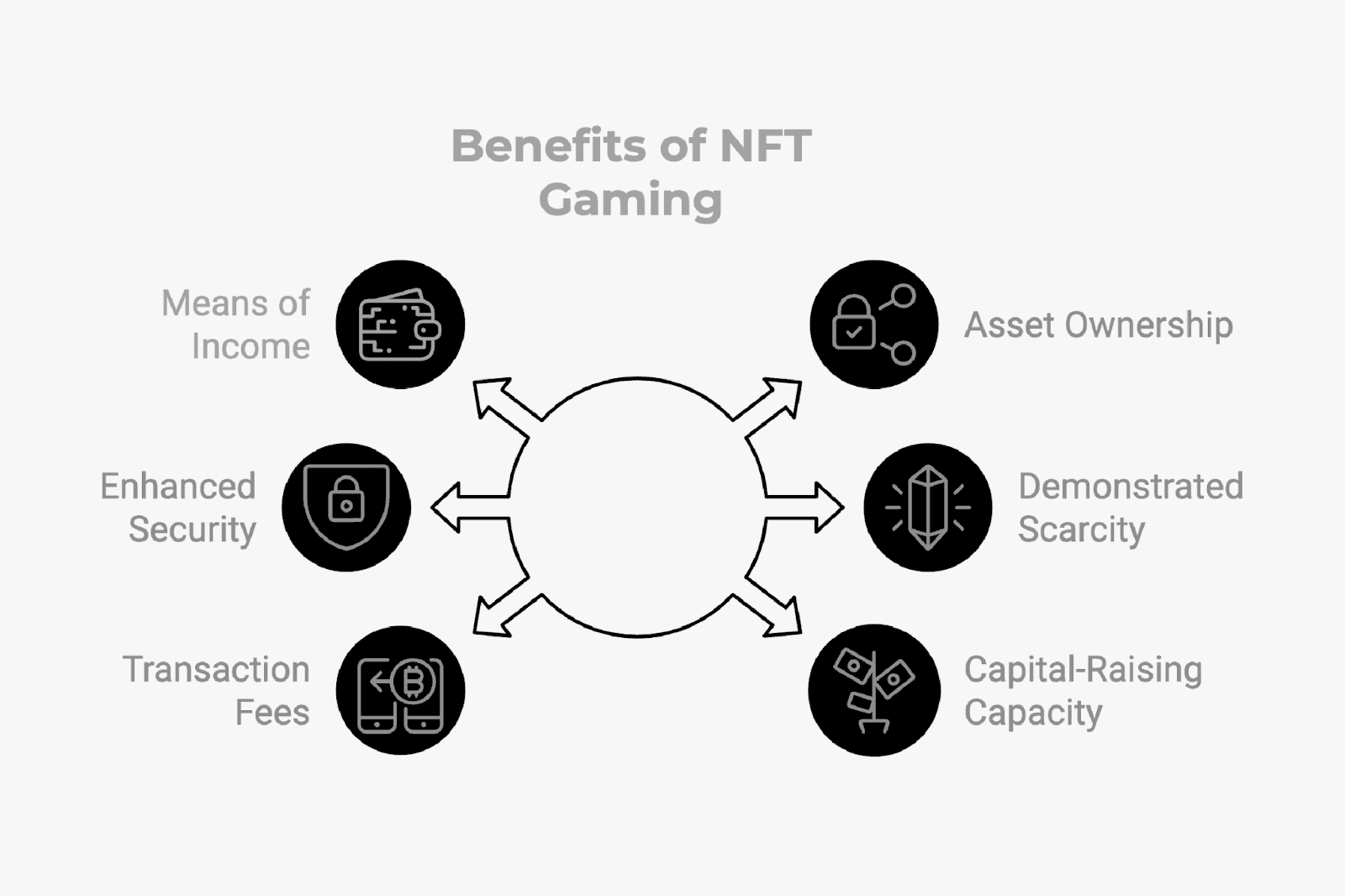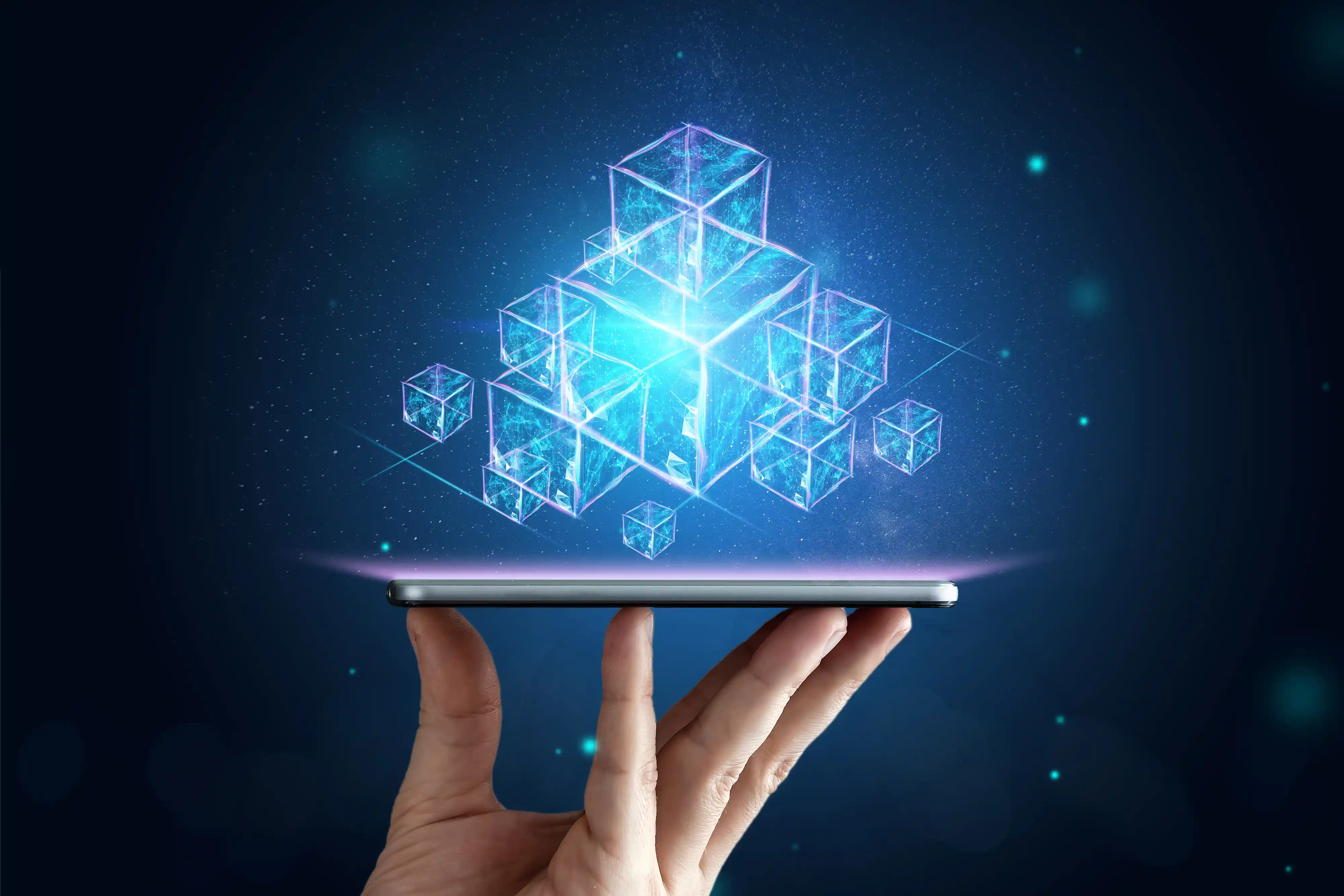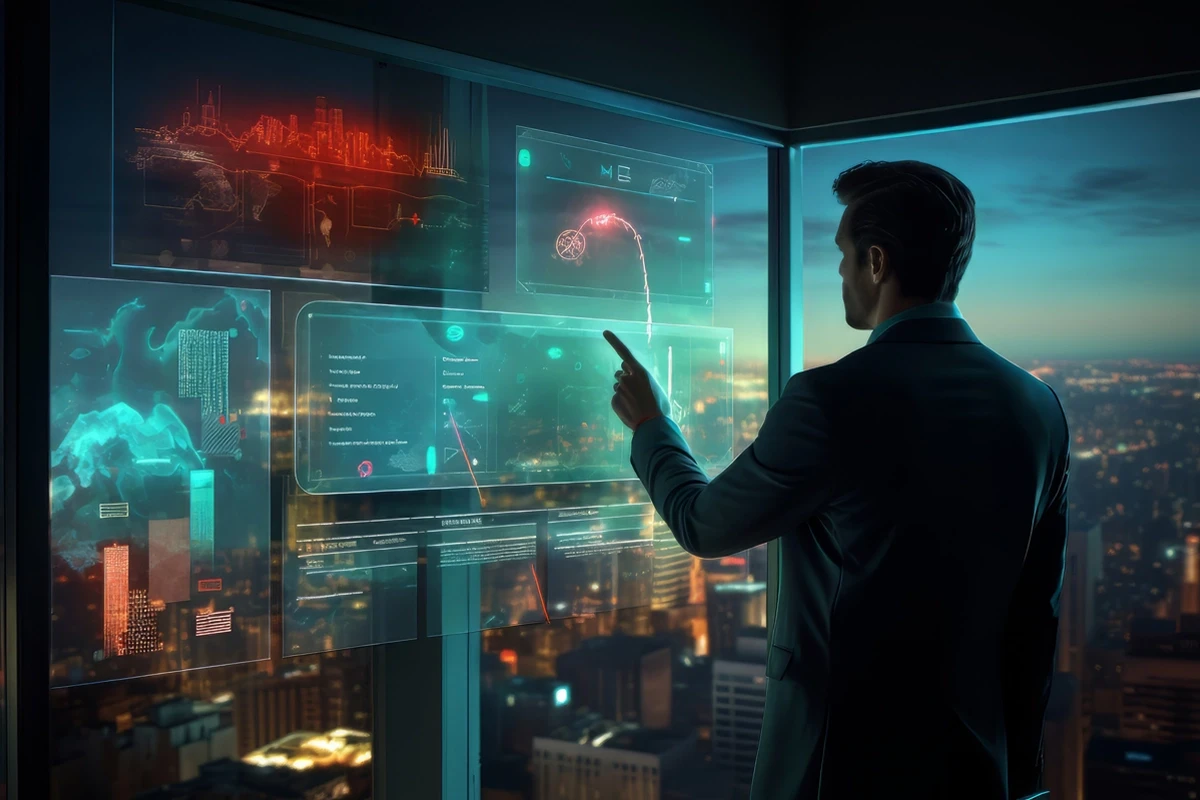How NFT Gaming is Revolutionizing the Gaming Industry with Web3 Technology
Dec 9, 2024



Web3 has transformed the gaming industry by combining blockchain, cryptocurrencies, and non-fungible tokens (NFTs) to create engaging and immersive gaming experiences. Known as NFT gaming, this innovation allows players to truly own digital assets and benefit from interoperability between platforms. The popularity of NFT gaming is evident, with 1.22 million unique active wallets participating in Web3 games in the first half of 2022, accounting for 52% of all blockchain activity. This surge highlights the significant impact of NFT gaming on blockchain adoption and its potential to reshape the industry. As Web3 game development and NFT game development continue to advance, they play a central role in driving this transformation.
In 2021, gaming made up 49% of all blockchain usage, with blockchain-based games engaging over 1.4 million active players every year. By early 2022, the market for blockchain gaming grew by an astonishing 2000% compared to the previous year. Investments poured in, with $2.5 billion raised in the first quarter of 2022 and $4 billion in total by the end of 2021. These figures highlight how NFT gaming is not just growing but becoming a central part of the future of gaming, fueled by ongoing innovations in Web3 game development and NFT game development.
Benefits of NFT Gaming
NFT gaming is widely considered the future of the gaming industry due to its transformative advantages over traditional gaming models. Here are the key benefits:

Provides a Means of Income
In regions with weak economies and high unemployment rates, NFT gaming offers an opportunity for individuals to earn money by doing what they love playing games. This potential to generate income has made NFT games particularly popular in developing nations.
In-Game Asset Ownership
Traditional games restrict players from trading or exchanging their purchased assets. NFT games, however, revolutionize this by enabling players to own their in-game assets as NFTs. These assets can be traded or sold to other players, either within the game ecosystem or on external platforms.
Enhanced Security
Built on blockchain technology, NFTs are unique and impossible to duplicate. This guarantees the safety of a player's hard-earned NFTs, preventing any copying or theft. Loss of NFTs typically occurs only in cases of fraud or when a participant grants malicious smart contracts access to their wallet.
Demonstrated Scarcity
The rarity of an NFT often determines its value. Blockchain technology underpins the transparency of NFT gaming, allowing for the simple verification of an NFT's owner and scarcity. This demonstrated scarcity significantly contributes to the perceived and market value of NFTs.
Commission for Transaction Fees
NFT gaming offers benefits not only for players but also for creators. Game publishers can earn a commission from transaction fees when they buy, sell, or trade NFTs. This creates a revenue stream for developers and publishers with every NFT transaction.
Capital-raising capacity
NFT gaming also attracts investors who are knowledgeable about blockchain and cryptocurrencies. Game publishers can leverage the interest in NFTs to raise funds for their projects, ensuring financial support for game development and expansion.
5 Ways NFT Gaming is Reshaping the Gaming Industry
NFT gaming is revolutionizing the gaming landscape by introducing decentralized systems, player-driven economies, and true asset ownership. Here's a closer look at five key ways NFT gaming is transforming the industry:
Independent NFT Games
Decentralized games operate on distinct blockchains, enabling them to function independently within various ecosystems. This ensures that players retain ownership of their assets even if a specific game shuts down. NFTs, which are distinct from individual games, offer the following benefits:
A secure identity: Players link their NFT account to a unique digital identity.
Ownership of digital assets: Thanks to blockchain technology, users can securely store their in-game items and trade them on NFT marketplaces for cryptocurrency or fiat money.
This independence grants players long-term security and value for their digital investments.
Make cryptocurrency rewards
NFT gaming introduces the play-to-earn model, which offers players financial incentives in addition to in-game rewards. Through cryptocurrency prizes and passive income opportunities, players can monetize their participation. Key highlights include:
Tokenized rewards: You can convert tools, weapons, and other in-game assets into NFTs.
Players profit from a user-driven economy that bridges virtual and physical economies, allowing them to trade in-game earnings for cryptocurrencies or real-world money.
This integration ensures that active participation in NFT games leads to tangible financial benefits.
Gaming Virtual Assets You Can Own
Developers control the assets in traditional games, but NFT gaming gives players complete ownership over their in-game items. By contributing to the game economy through upgrades, purchases, or crafting, players add value to the community. Key aspects include:
Player-driven economies: Gamers unlock upgrades, create items, and influence the value of assets.
Ownership of contributions: Through NFTs, players retain and control the value they bring to the ecosystem.
This shift toward true asset ownership enhances player engagement and loyalty.
Purchasing & Selling NFTs In-Game
A cornerstone of NFT gaming is the ability to create, acquire, and trade in-game assets. Popular NFT-based games facilitate the buying and selling of various assets.
Manufactured weaponry and power-ups: Players can craft and trade powerful in-game items.
Marketplace trading: Online gaming marketplaces enable players to sell their NFT collections for cryptocurrency or fiat.
This model fosters an open, dynamic marketplace that rewards players for their creativity and effort.
A Fresh Open Gaming Industry
NFT gaming fosters an open economy, motivating players to actively participate. Rewards include in-game assets and real-world cryptocurrency, encouraging deeper engagement. Key benefits include:
Rising asset value: As NFT-based games grow in popularity, the value of in-game assets and characters increases.
Real-world rewards: Substantial monetary returns motivate players to invest their time and effort.
This approach ensures a more inclusive and rewarding gaming ecosystem for players and developers alike.
Challenges in Building NFT Gaming Applications
While NFT gaming offers exciting prospects, developers face several challenges:
Technical Complexity:
Creating games with blockchain-based ownership and interoperability requires expertise in blockchain development and seamless integration with existing gaming infrastructure.
Scalability Issues:
As user bases grow, ensuring that blockchain networks can handle high volumes of transactions without compromising speed or cost is a persistent challenge.
Regulatory Concerns:
The evolving regulatory landscape for NFTs and cryptocurrencies may pose risks to developers and players alike.
User Education:
Many potential players may not understand the value of blockchain or how to navigate crypto wallets and NFT marketplaces.
Sustainability:
Blockchain networks often face criticism for their environmental impact. Developers must adopt eco-friendly solutions without sacrificing efficiency.
By addressing these challenges, NFT gaming can continue to revolutionize the industry, driving Web3 innovation forward.
Conclusion
NFT gaming is changing the gaming industry by using blockchain technology to give players real ownership of their digital assets and create a player-driven economy. Players can trade in-game items, earn through play-to-earn models, and enjoy the flexibility of assets that work across platforms. The growth in active players and investments shows how much potential this space has. Companies like Decentrablock, specializing in Web3 game development, are at the forefront of this evolution, enabling innovative solutions to build scalable, secure, and engaging NFT gaming ecosystems. While challenges like scalability, regulation, and sustainability persist, ongoing advancements continue to position NFT gaming as a pivotal force in reshaping the future of the gaming landscape.
Web3 has transformed the gaming industry by combining blockchain, cryptocurrencies, and non-fungible tokens (NFTs) to create engaging and immersive gaming experiences. Known as NFT gaming, this innovation allows players to truly own digital assets and benefit from interoperability between platforms. The popularity of NFT gaming is evident, with 1.22 million unique active wallets participating in Web3 games in the first half of 2022, accounting for 52% of all blockchain activity. This surge highlights the significant impact of NFT gaming on blockchain adoption and its potential to reshape the industry. As Web3 game development and NFT game development continue to advance, they play a central role in driving this transformation.
In 2021, gaming made up 49% of all blockchain usage, with blockchain-based games engaging over 1.4 million active players every year. By early 2022, the market for blockchain gaming grew by an astonishing 2000% compared to the previous year. Investments poured in, with $2.5 billion raised in the first quarter of 2022 and $4 billion in total by the end of 2021. These figures highlight how NFT gaming is not just growing but becoming a central part of the future of gaming, fueled by ongoing innovations in Web3 game development and NFT game development.
Benefits of NFT Gaming
NFT gaming is widely considered the future of the gaming industry due to its transformative advantages over traditional gaming models. Here are the key benefits:

Provides a Means of Income
In regions with weak economies and high unemployment rates, NFT gaming offers an opportunity for individuals to earn money by doing what they love playing games. This potential to generate income has made NFT games particularly popular in developing nations.
In-Game Asset Ownership
Traditional games restrict players from trading or exchanging their purchased assets. NFT games, however, revolutionize this by enabling players to own their in-game assets as NFTs. These assets can be traded or sold to other players, either within the game ecosystem or on external platforms.
Enhanced Security
Built on blockchain technology, NFTs are unique and impossible to duplicate. This guarantees the safety of a player's hard-earned NFTs, preventing any copying or theft. Loss of NFTs typically occurs only in cases of fraud or when a participant grants malicious smart contracts access to their wallet.
Demonstrated Scarcity
The rarity of an NFT often determines its value. Blockchain technology underpins the transparency of NFT gaming, allowing for the simple verification of an NFT's owner and scarcity. This demonstrated scarcity significantly contributes to the perceived and market value of NFTs.
Commission for Transaction Fees
NFT gaming offers benefits not only for players but also for creators. Game publishers can earn a commission from transaction fees when they buy, sell, or trade NFTs. This creates a revenue stream for developers and publishers with every NFT transaction.
Capital-raising capacity
NFT gaming also attracts investors who are knowledgeable about blockchain and cryptocurrencies. Game publishers can leverage the interest in NFTs to raise funds for their projects, ensuring financial support for game development and expansion.
5 Ways NFT Gaming is Reshaping the Gaming Industry
NFT gaming is revolutionizing the gaming landscape by introducing decentralized systems, player-driven economies, and true asset ownership. Here's a closer look at five key ways NFT gaming is transforming the industry:
Independent NFT Games
Decentralized games operate on distinct blockchains, enabling them to function independently within various ecosystems. This ensures that players retain ownership of their assets even if a specific game shuts down. NFTs, which are distinct from individual games, offer the following benefits:
A secure identity: Players link their NFT account to a unique digital identity.
Ownership of digital assets: Thanks to blockchain technology, users can securely store their in-game items and trade them on NFT marketplaces for cryptocurrency or fiat money.
This independence grants players long-term security and value for their digital investments.
Make cryptocurrency rewards
NFT gaming introduces the play-to-earn model, which offers players financial incentives in addition to in-game rewards. Through cryptocurrency prizes and passive income opportunities, players can monetize their participation. Key highlights include:
Tokenized rewards: You can convert tools, weapons, and other in-game assets into NFTs.
Players profit from a user-driven economy that bridges virtual and physical economies, allowing them to trade in-game earnings for cryptocurrencies or real-world money.
This integration ensures that active participation in NFT games leads to tangible financial benefits.
Gaming Virtual Assets You Can Own
Developers control the assets in traditional games, but NFT gaming gives players complete ownership over their in-game items. By contributing to the game economy through upgrades, purchases, or crafting, players add value to the community. Key aspects include:
Player-driven economies: Gamers unlock upgrades, create items, and influence the value of assets.
Ownership of contributions: Through NFTs, players retain and control the value they bring to the ecosystem.
This shift toward true asset ownership enhances player engagement and loyalty.
Purchasing & Selling NFTs In-Game
A cornerstone of NFT gaming is the ability to create, acquire, and trade in-game assets. Popular NFT-based games facilitate the buying and selling of various assets.
Manufactured weaponry and power-ups: Players can craft and trade powerful in-game items.
Marketplace trading: Online gaming marketplaces enable players to sell their NFT collections for cryptocurrency or fiat.
This model fosters an open, dynamic marketplace that rewards players for their creativity and effort.
A Fresh Open Gaming Industry
NFT gaming fosters an open economy, motivating players to actively participate. Rewards include in-game assets and real-world cryptocurrency, encouraging deeper engagement. Key benefits include:
Rising asset value: As NFT-based games grow in popularity, the value of in-game assets and characters increases.
Real-world rewards: Substantial monetary returns motivate players to invest their time and effort.
This approach ensures a more inclusive and rewarding gaming ecosystem for players and developers alike.
Challenges in Building NFT Gaming Applications
While NFT gaming offers exciting prospects, developers face several challenges:
Technical Complexity:
Creating games with blockchain-based ownership and interoperability requires expertise in blockchain development and seamless integration with existing gaming infrastructure.
Scalability Issues:
As user bases grow, ensuring that blockchain networks can handle high volumes of transactions without compromising speed or cost is a persistent challenge.
Regulatory Concerns:
The evolving regulatory landscape for NFTs and cryptocurrencies may pose risks to developers and players alike.
User Education:
Many potential players may not understand the value of blockchain or how to navigate crypto wallets and NFT marketplaces.
Sustainability:
Blockchain networks often face criticism for their environmental impact. Developers must adopt eco-friendly solutions without sacrificing efficiency.
By addressing these challenges, NFT gaming can continue to revolutionize the industry, driving Web3 innovation forward.
Conclusion
NFT gaming is changing the gaming industry by using blockchain technology to give players real ownership of their digital assets and create a player-driven economy. Players can trade in-game items, earn through play-to-earn models, and enjoy the flexibility of assets that work across platforms. The growth in active players and investments shows how much potential this space has. Companies like Decentrablock, specializing in Web3 game development, are at the forefront of this evolution, enabling innovative solutions to build scalable, secure, and engaging NFT gaming ecosystems. While challenges like scalability, regulation, and sustainability persist, ongoing advancements continue to position NFT gaming as a pivotal force in reshaping the future of the gaming landscape.
Web3 has transformed the gaming industry by combining blockchain, cryptocurrencies, and non-fungible tokens (NFTs) to create engaging and immersive gaming experiences. Known as NFT gaming, this innovation allows players to truly own digital assets and benefit from interoperability between platforms. The popularity of NFT gaming is evident, with 1.22 million unique active wallets participating in Web3 games in the first half of 2022, accounting for 52% of all blockchain activity. This surge highlights the significant impact of NFT gaming on blockchain adoption and its potential to reshape the industry. As Web3 game development and NFT game development continue to advance, they play a central role in driving this transformation.
In 2021, gaming made up 49% of all blockchain usage, with blockchain-based games engaging over 1.4 million active players every year. By early 2022, the market for blockchain gaming grew by an astonishing 2000% compared to the previous year. Investments poured in, with $2.5 billion raised in the first quarter of 2022 and $4 billion in total by the end of 2021. These figures highlight how NFT gaming is not just growing but becoming a central part of the future of gaming, fueled by ongoing innovations in Web3 game development and NFT game development.
Benefits of NFT Gaming
NFT gaming is widely considered the future of the gaming industry due to its transformative advantages over traditional gaming models. Here are the key benefits:

Provides a Means of Income
In regions with weak economies and high unemployment rates, NFT gaming offers an opportunity for individuals to earn money by doing what they love playing games. This potential to generate income has made NFT games particularly popular in developing nations.
In-Game Asset Ownership
Traditional games restrict players from trading or exchanging their purchased assets. NFT games, however, revolutionize this by enabling players to own their in-game assets as NFTs. These assets can be traded or sold to other players, either within the game ecosystem or on external platforms.
Enhanced Security
Built on blockchain technology, NFTs are unique and impossible to duplicate. This guarantees the safety of a player's hard-earned NFTs, preventing any copying or theft. Loss of NFTs typically occurs only in cases of fraud or when a participant grants malicious smart contracts access to their wallet.
Demonstrated Scarcity
The rarity of an NFT often determines its value. Blockchain technology underpins the transparency of NFT gaming, allowing for the simple verification of an NFT's owner and scarcity. This demonstrated scarcity significantly contributes to the perceived and market value of NFTs.
Commission for Transaction Fees
NFT gaming offers benefits not only for players but also for creators. Game publishers can earn a commission from transaction fees when they buy, sell, or trade NFTs. This creates a revenue stream for developers and publishers with every NFT transaction.
Capital-raising capacity
NFT gaming also attracts investors who are knowledgeable about blockchain and cryptocurrencies. Game publishers can leverage the interest in NFTs to raise funds for their projects, ensuring financial support for game development and expansion.
5 Ways NFT Gaming is Reshaping the Gaming Industry
NFT gaming is revolutionizing the gaming landscape by introducing decentralized systems, player-driven economies, and true asset ownership. Here's a closer look at five key ways NFT gaming is transforming the industry:
Independent NFT Games
Decentralized games operate on distinct blockchains, enabling them to function independently within various ecosystems. This ensures that players retain ownership of their assets even if a specific game shuts down. NFTs, which are distinct from individual games, offer the following benefits:
A secure identity: Players link their NFT account to a unique digital identity.
Ownership of digital assets: Thanks to blockchain technology, users can securely store their in-game items and trade them on NFT marketplaces for cryptocurrency or fiat money.
This independence grants players long-term security and value for their digital investments.
Make cryptocurrency rewards
NFT gaming introduces the play-to-earn model, which offers players financial incentives in addition to in-game rewards. Through cryptocurrency prizes and passive income opportunities, players can monetize their participation. Key highlights include:
Tokenized rewards: You can convert tools, weapons, and other in-game assets into NFTs.
Players profit from a user-driven economy that bridges virtual and physical economies, allowing them to trade in-game earnings for cryptocurrencies or real-world money.
This integration ensures that active participation in NFT games leads to tangible financial benefits.
Gaming Virtual Assets You Can Own
Developers control the assets in traditional games, but NFT gaming gives players complete ownership over their in-game items. By contributing to the game economy through upgrades, purchases, or crafting, players add value to the community. Key aspects include:
Player-driven economies: Gamers unlock upgrades, create items, and influence the value of assets.
Ownership of contributions: Through NFTs, players retain and control the value they bring to the ecosystem.
This shift toward true asset ownership enhances player engagement and loyalty.
Purchasing & Selling NFTs In-Game
A cornerstone of NFT gaming is the ability to create, acquire, and trade in-game assets. Popular NFT-based games facilitate the buying and selling of various assets.
Manufactured weaponry and power-ups: Players can craft and trade powerful in-game items.
Marketplace trading: Online gaming marketplaces enable players to sell their NFT collections for cryptocurrency or fiat.
This model fosters an open, dynamic marketplace that rewards players for their creativity and effort.
A Fresh Open Gaming Industry
NFT gaming fosters an open economy, motivating players to actively participate. Rewards include in-game assets and real-world cryptocurrency, encouraging deeper engagement. Key benefits include:
Rising asset value: As NFT-based games grow in popularity, the value of in-game assets and characters increases.
Real-world rewards: Substantial monetary returns motivate players to invest their time and effort.
This approach ensures a more inclusive and rewarding gaming ecosystem for players and developers alike.
Challenges in Building NFT Gaming Applications
While NFT gaming offers exciting prospects, developers face several challenges:
Technical Complexity:
Creating games with blockchain-based ownership and interoperability requires expertise in blockchain development and seamless integration with existing gaming infrastructure.
Scalability Issues:
As user bases grow, ensuring that blockchain networks can handle high volumes of transactions without compromising speed or cost is a persistent challenge.
Regulatory Concerns:
The evolving regulatory landscape for NFTs and cryptocurrencies may pose risks to developers and players alike.
User Education:
Many potential players may not understand the value of blockchain or how to navigate crypto wallets and NFT marketplaces.
Sustainability:
Blockchain networks often face criticism for their environmental impact. Developers must adopt eco-friendly solutions without sacrificing efficiency.
By addressing these challenges, NFT gaming can continue to revolutionize the industry, driving Web3 innovation forward.
Conclusion
NFT gaming is changing the gaming industry by using blockchain technology to give players real ownership of their digital assets and create a player-driven economy. Players can trade in-game items, earn through play-to-earn models, and enjoy the flexibility of assets that work across platforms. The growth in active players and investments shows how much potential this space has. Companies like Decentrablock, specializing in Web3 game development, are at the forefront of this evolution, enabling innovative solutions to build scalable, secure, and engaging NFT gaming ecosystems. While challenges like scalability, regulation, and sustainability persist, ongoing advancements continue to position NFT gaming as a pivotal force in reshaping the future of the gaming landscape.

DecentraBlock is at the forefront of blockchain innovation, revolutionizing how businesses secure, transact, and grow in the digital age. Join us on a journey to harness the full potential of decentralized technology for a more efficient and transparent future.
Services
Subscribe to Our Newsletter
Get the latest news, updates, and insights on blockchain technology directly to your inbox. Sign up for our newsletter today!
© 2024 DecentraBlock. All rights reserved.

DecentraBlock is at the forefront of blockchain innovation, revolutionizing how businesses secure, transact, and grow in the digital age. Join us on a journey to harness the full potential of decentralized technology for a more efficient and transparent future.
Services
Subscribe to Our Newsletter
Get the latest news, updates, and insights on blockchain technology directly to your inbox. Sign up for our newsletter today!
© 2024 DecentraBlock. All rights reserved.

DecentraBlock is at the forefront of blockchain innovation, revolutionizing how businesses secure, transact, and grow in the digital age. Join us on a journey to harness the full potential of decentralized technology for a more efficient and transparent future.
Services
Subscribe to Our Newsletter
Get the latest news, updates, and insights on blockchain technology directly to your inbox. Sign up for our newsletter today!
© 2024 DecentraBlock. All rights reserved.


